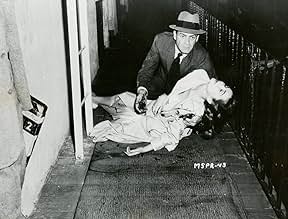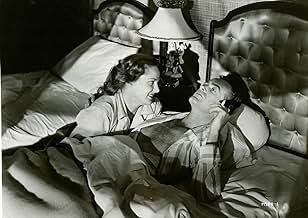Agrega una trama en tu idiomaIn Arizona, a train's baggage car is robbed of a large payroll, prompting an investigation led by a railroad official-insurance investigator team.In Arizona, a train's baggage car is robbed of a large payroll, prompting an investigation led by a railroad official-insurance investigator team.In Arizona, a train's baggage car is robbed of a large payroll, prompting an investigation led by a railroad official-insurance investigator team.
- Dirección
- Guionistas
- Elenco
Rodolfo Hoyos Jr.
- Lt. Castro
- (as Rudolpho Hoyos)
Robert Anderson
- Sheriff Jack of Winston
- (sin créditos)
Raymond Bailey
- Sam Hendricks
- (sin créditos)
Art Balinger
- Jail Officer
- (sin créditos)
Howard Culver
- Pete the detective
- (sin créditos)
Roy Glenn
- Train Porter
- (sin créditos)
William Kendis
- Eddie, baggage handler
- (sin créditos)
John Maxwell
- Train Conductor
- (sin créditos)
Anna Navarro
- Mexican Bar Fly
- (sin créditos)
- Dirección
- Guionistas
- Todo el elenco y el equipo
- Producción, taquilla y más en IMDbPro
Opiniones destacadas
The film gets off to a really good start. A slick crime with no clues appearing and you're wondering how the investigators are going to solve it. I'm thinking this is great (8 or 9 out of 10); a real puzzle but out of the blue they catch a member of the gang with no explanation as to how they found him. Then other members of the gang start making mistakes by not following orders. If the crime had been solved by deduction it could have been a great movie. Gripping start but soon disappoints.
After robbers steal $50,000 from a train, an insurance investigator (Mark Stevens) is assigned to investigate, who in fact one of the ring leaders of the train robbery and needs to make the investigation seem credible.
Produced, directed by and starring Stevens, this is an interestingly plotted crime thriller written by Aben Kendel that contains plenty of twists and turns with some decent changes in direction with Stevens' character trying to double cross his co-thieves.
Produced, directed by and starring Stevens, this is an interestingly plotted crime thriller written by Aben Kendel that contains plenty of twists and turns with some decent changes in direction with Stevens' character trying to double cross his co-thieves.
Gang executes intricate train robbery, putting two insurance investigators on their trail, with a major twist.
At about the time Kubrick was making a reputation with his heist film The Killing (1956), Mark Stevens put together this little gem. Unlike Kubrick's classic, this caper film doesn't rise to semi-artistic heights, but it is tight, tough, and well-acted, with some nice touches. For example, there're the surly baggage handler and the brusque airplane mechanic, both colorful bits that could have easily remained routine.
Aben Kandel's script is carefully plotted, dribbling out pieces of information that keep us glued to developments-- plus that great opening hook with its careful staging. But what I especially like is his and Stevens' attention to jilted wife Ruth (Stewart). It would have been so easy to shove this plain-faced woman aside as Stevens cavorts with the lovely Linda (Farr). Instead they play up her heartbreak as this drably devoted wife watches the collapse of everything she holds dear. In my book, it's a sensitive dimension that helps lift this 80- minutes beyond the simply well-crafted.
In addition to Stewart's fine performance is King Calder's (Armstong). His humorless, Bassett hound face is perfect for the dogged investigator who knows the importance of visualizing and goes where the evidence takes him, regardless. Look too for Jack Klugman (Frankie) in one of his earliest film roles.
Judging from Stevens' list of credits (IMDB), he's one of those contract players trying his best after the break up of the old studio system and the decline of the B-movie. Whatever his later misfortunes (Gunsight Ridge {1957}; Gun Fever {1958})-- he and Kandel team up to score solidly with this overlooked little caper gem.
At about the time Kubrick was making a reputation with his heist film The Killing (1956), Mark Stevens put together this little gem. Unlike Kubrick's classic, this caper film doesn't rise to semi-artistic heights, but it is tight, tough, and well-acted, with some nice touches. For example, there're the surly baggage handler and the brusque airplane mechanic, both colorful bits that could have easily remained routine.
Aben Kandel's script is carefully plotted, dribbling out pieces of information that keep us glued to developments-- plus that great opening hook with its careful staging. But what I especially like is his and Stevens' attention to jilted wife Ruth (Stewart). It would have been so easy to shove this plain-faced woman aside as Stevens cavorts with the lovely Linda (Farr). Instead they play up her heartbreak as this drably devoted wife watches the collapse of everything she holds dear. In my book, it's a sensitive dimension that helps lift this 80- minutes beyond the simply well-crafted.
In addition to Stewart's fine performance is King Calder's (Armstong). His humorless, Bassett hound face is perfect for the dogged investigator who knows the importance of visualizing and goes where the evidence takes him, regardless. Look too for Jack Klugman (Frankie) in one of his earliest film roles.
Judging from Stevens' list of credits (IMDB), he's one of those contract players trying his best after the break up of the old studio system and the decline of the B-movie. Whatever his later misfortunes (Gunsight Ridge {1957}; Gun Fever {1958})-- he and Kandel team up to score solidly with this overlooked little caper gem.
The Quick Pitch: $500,000 in cash is stolen from a train's baggage car.
Not a lot to say other than that this is a good one. My little plot summary may be shorter than usual, but I don't want to spoil anything. Time Table has a couple of plot twists that are about as good as any I've seen. The first comes early on in the film. While I may have had an inkling of what was about to happen, I still enjoyed watching the events unfold. But the second twist caught me by complete surprise. What fun!
Time Table is one of those films that proves you can (or at least you could in 1956) make a quality little movie without breaking the bank. Given budgetary constraints, director Mark Stevens created a tense, atmospheric crime/noir/thriller that moves at a brisk pace and is entertaining throughout. Not only does Stevens direct, but he also stars in Time Table. His performance is just as solid as his direction. The mostly no-name supporting cast is equal to the challenge. I'm sure I could pick a few things to complain about, but why bother when a movie is this enjoyable.
7/10
Not a lot to say other than that this is a good one. My little plot summary may be shorter than usual, but I don't want to spoil anything. Time Table has a couple of plot twists that are about as good as any I've seen. The first comes early on in the film. While I may have had an inkling of what was about to happen, I still enjoyed watching the events unfold. But the second twist caught me by complete surprise. What fun!
Time Table is one of those films that proves you can (or at least you could in 1956) make a quality little movie without breaking the bank. Given budgetary constraints, director Mark Stevens created a tense, atmospheric crime/noir/thriller that moves at a brisk pace and is entertaining throughout. Not only does Stevens direct, but he also stars in Time Table. His performance is just as solid as his direction. The mostly no-name supporting cast is equal to the challenge. I'm sure I could pick a few things to complain about, but why bother when a movie is this enjoyable.
7/10
It's remarkable how many actors from the Golden Age of Hollywood began or ended their careers making crime pictures ( or horror movies). Mark Stevens is a case in point. He began promisingly enough with the stylish noir The Dark Corner in 1946 and basically ended it with Timetable ten years later. Was he a classic Marlowesque private eye in the first one, in Timetable the rigors of maintaining a Hollywood career have visibly and morally taken their toll. Directed by Stevens himself, all the glamour of the classic noir is drained from both the look of the film as from the protagonists. Stevens has the look of a man who has seen too much and has basically given up hope that his life will change for the better. Even his last desperate attempt to turn his life around seems doomed from the start. Which is not helped by the strict moral code of the day that is constantly underlined, namely that Crime Doesn't Pay. The plot is a little convoluted, but then that's not what we watch these movies for. Stylistically it has little going for it,and small effort was made to avoid a stage-bound look. But the performances are adequate enough and especially Stevens is totally convincing as the world-weary protagonist. For noir fans this one is certainly worth a look.
¿Sabías que…?
- TriviaThe $500,000 payroll stolen would be the equivalent of $4,400,000 in 2016.
- ErroresIn the robbery, Dr. Paul Brucker removes three small cash bags from the safe and puts them in his suitcase. But the heist was $500,000 in small bills. Even all new $20 bills wrapped and stacked together would make a pile more than nine feet high. With mixed used small bills ($5 to $20) that couldn't be traced, it would take a large suitcase to handle the money. And, it would weigh at least 60 pounds.
- Citas
Joe Armstrong: There's no such thing as a perfect crime. Just a lucky one. But their luck will run out.
- ConexionesFeatured in The World Famous Kid Detective (2014)
Selecciones populares
Inicia sesión para calificar y agrega a la lista de videos para obtener recomendaciones personalizadas
- How long is Time Table?Con tecnología de Alexa
Detalles
- Tiempo de ejecución1 hora 20 minutos
- Color
- Relación de aspecto
- 1.37 : 1
Contribuir a esta página
Sugiere una edición o agrega el contenido que falta

Principales brechas de datos
By what name was Time Table (1956) officially released in India in English?
Responda




































